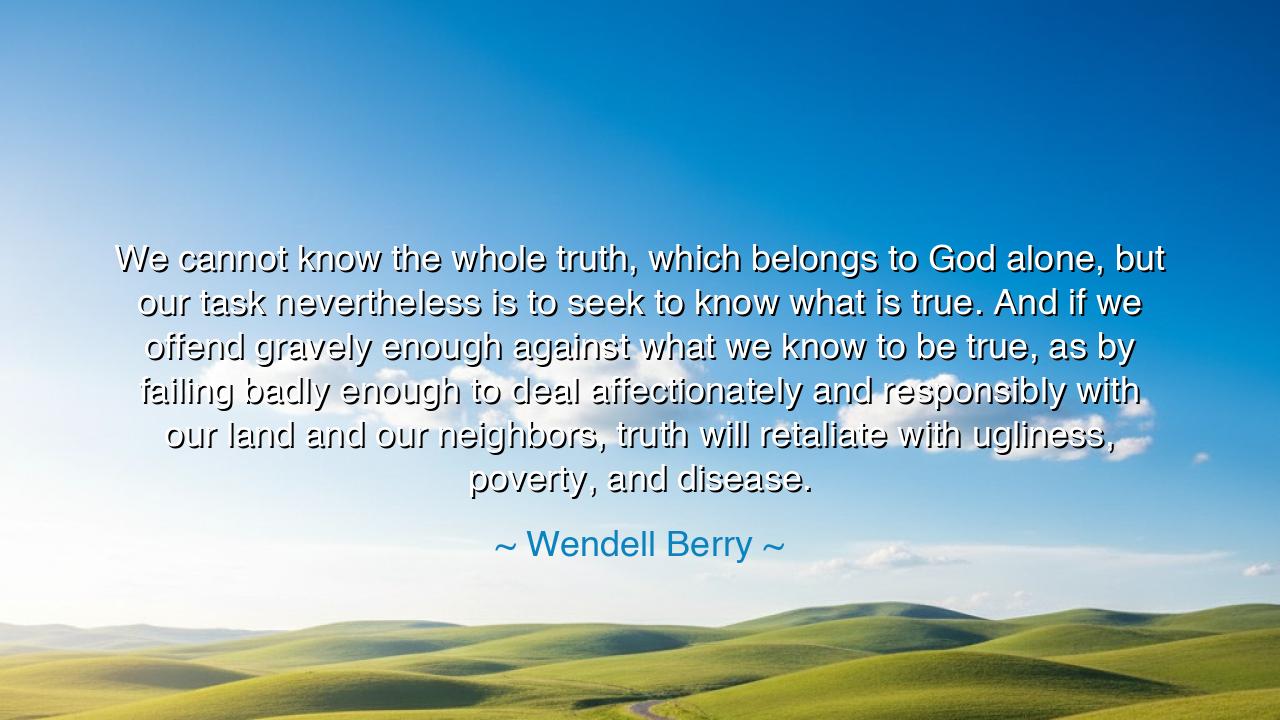
We cannot know the whole truth, which belongs to God alone, but
We cannot know the whole truth, which belongs to God alone, but our task nevertheless is to seek to know what is true. And if we offend gravely enough against what we know to be true, as by failing badly enough to deal affectionately and responsibly with our land and our neighbors, truth will retaliate with ugliness, poverty, and disease.






In the quiet and steadfast voice of the farmer-philosopher Wendell Berry, these words ring like a bell in a storm: “We cannot know the whole truth, which belongs to God alone, but our task nevertheless is to seek to know what is true. And if we offend gravely enough against what we know to be true, as by failing badly enough to deal affectionately and responsibly with our land and our neighbors, truth will retaliate with ugliness, poverty, and disease.” In this saying lies the moral architecture of creation—the understanding that truth is not an ornament for philosophers, but a living covenant between humanity, the earth, and the divine.
Berry’s wisdom arises from the soil itself, from the ancient rhythm of seed and harvest, of care and consequence. He speaks not as a distant thinker but as one who has walked the furrows of the land and felt both its generosity and its grief. He reminds us that while the whole truth—the full design of creation—belongs to God alone, we are not freed from the sacred duty of seeking it. Our portion of truth is found in how we live, how we treat the land that feeds us, and how we honor the neighbors who share it. Truth, for Berry, is not abstract—it is embodied in relationship, and when we betray it, the betrayal returns to us in kind.
This idea echoes the old teachings of the ancients, who saw the world not as a possession but as a living order, held in balance by reverence and restraint. When this balance is broken, the harmony of the world falters. The ancient Greeks spoke of hubris, the arrogance of those who defy divine order—and nemesis, the retribution that inevitably follows. So too does Berry speak of truth’s retaliation: the ugliness, poverty, and disease that rise when we exploit rather than cherish, consume rather than care. His language is not punishment but consequence—the natural law of moral ecology. When we plunder the soil, pollute the water, and neglect the bonds of community, we offend the very truth of existence—and that truth, once scorned, strikes back.
We can see this mirrored in the story of the Dust Bowl in the 1930s. In their hunger for profit and expansion, farmers tore up millions of acres of prairie grass that had long protected the soil. The land, stripped of its roots, rose in black clouds that swallowed the sky. Fields became deserts, families fled their homes, and nature answered greed with desolation. This was truth retaliating—the earth mirroring the disorder of human hearts. From such suffering came wisdom: that the soil, like the soul, must be tended with humility, not conquered with pride. Berry’s words stand as a continuation of that lesson, a reminder that every act of neglect toward the land or one another is a kind of untruth, and every untruth bears fruit in sorrow.
Yet, within his warning lies a luminous hope. Though we cannot know all truth, we can live faithfully within what has been revealed to us. Our task is not omniscience but obedience—to listen to the whispers of creation, to act with affection and responsibility. Berry calls us back to the ancient discipline of stewardship, where knowledge is not measured in information, but in care. To seek truth is to live in alignment with the rhythms of nature, to plant with reverence, to consume with gratitude, to walk lightly upon the earth knowing that our footprints are eternal.
This teaching extends beyond soil and seed; it speaks to the human heart. Just as the land withers when neglected, so too does the spirit decay when we forsake honesty, kindness, and accountability. The ugliness of deceit, the poverty of greed, the disease of hatred—these, too, are nature’s response to moral imbalance. Truth is not a luxury of the wise, but the sustenance of all life. To offend against it is to cut the roots of our own being; to honor it is to flourish.
The lesson, then, is simple and sacred: though the whole truth is hidden in the mind of God, we must walk daily in the part we are given. Let your actions be your seeking. Treat the land as a companion, not a servant. Treat your neighbor as your kin, not your rival. And when you speak or act, let your choices affirm the harmony of the world, not its unraveling. For truth is patient, but it is never silent—it will reveal, in beauty or in ruin, the measure of our faithfulness.
So remember this, O listener: the earth keeps account of our honesty. When we live with affection and care, the fields blossom, the rivers sing, and peace dwells among us. But when we live by greed and disregard, truth itself will rise against us, as surely as the storm follows the drought. Seek truth, then—not to possess it, but to walk with it, humbly and steadfastly, as the ancients walked with the gods and the farmer walks with the seasons. For in that seeking lies our only path to grace.






AAdministratorAdministrator
Welcome, honored guests. Please leave a comment, we will respond soon